What Is Topical Authority in SEO? The Ultimate Guide to Boost Your Rankings

.jpg)
Defining Topical Authority in SEO: Concept and Significance

Topical authority refers to a website’s perceived expertise, credibility, and comprehensiveness on a specific subject matter in the eyes of search engines. Unlike traditional authority that focuses primarily on backlinks, topical authority evaluates how thoroughly your content covers a subject and its related subtopics.
At its core, topical authority reflects how well you’ve addressed the breadth and depth of a particular topic. Search engines like Google have evolved to recognize content clusters that demonstrate expertise rather than isolated pages targeting keywords.
According to a 2022 study by Semrush, websites with comprehensive topic coverage saw 58% higher organic visibility compared to those with disconnected content strategies.
Topical authority matters because:
-
It aligns with Google’s semantic search capabilities that understand relationships between topics
-
It builds user trust by providing complete information journeys
-
It creates natural internal linking opportunities
-
It generates higher-quality traffic with better conversion potential
The significance of topical authority has grown substantially since Google’s BERT and subsequent algorithm updates, which improved the search engine’s ability to understand contextual relationships between words, phrases, and topics rather than simply matching keywords.
Key Takeaways
| Key Point | Details |
| Definition of Topical Authority | Topical authority measures a website’s expertise and comprehensiveness on a subject, emphasizing content breadth and depth rather than merely backlinks. |
| Importance of Content Clusters | Search engines favor content clusters that demonstrate expertise, leading to better rankings and increased organic visibility by 58% for comprehensive topic coverage. |
| User Trust and Experience | Developing topical authority enhances user trust and credibility, positively impacting engagement and conversion rates through thorough, accurate information. |
The Impact of Topical Authority on Rankings and User Trust

Topical authority directly influences how search engines evaluate and position your content in search results. Websites demonstrating expertise across a subject area consistently outrank competitors with scattered, superficial coverage.
A landmark case study by Content Harmony revealed that websites establishing topical authority experienced an average 49% increase in organic traffic within six months, with significantly improved keyword rankings across related search terms.
The ranking benefits stem from several factors:
-
Search engines can confidently send users to sites that comprehensively address their needs
-
Content with topical authority naturally earns more backlinks as it becomes a reference point
-
Internal linking structures between related content create stronger relevance signals
-
Bounce rates decrease as users find complete information within your domain
Beyond rankings, topical authority builds user trust and credibility. When visitors consistently find thorough, accurate information on your site, they’re more likely to return, share your content, and convert. This positive user behavior creates a feedback loop that further reinforces your authority signals to search engines.
Google’s Quality Rater Guidelines explicitly prioritize E-E-A-T (Experience, Expertise, Authoritativeness, Trustworthiness) - principles directly enhanced through developing topical authority.
How to Build Topical Authority: Proven Strategies and Best Practices
Building topical authority requires a systematic approach to content development and strategic planning. Here are proven methods to establish yourself as an authority in your niche:
-
Conduct comprehensive topic research - Map out your entire subject area using tools like MarketMuse, Clearscope, or even free options like AnswerThePublic to identify all related subtopics.
-
Create a content cluster structure - Develop pillar content that broadly covers main topics, with supporting content addressing specific questions and subtopics. Ahrefs’ study of top-performing sites showed those using topic clusters saw 56% more organic traffic growth.
-
Prioritize depth and accuracy - Cover topics exhaustively with fact-checked information. Include statistics, examples, and expert insights rather than surface-level content.
-
Establish a consistent publishing cadence - Authority develops over time through regular content additions that expand topic coverage.
-
Update existing content regularly - Refreshing older content with new information maintains relevance and signals ongoing expertise.
-
Leverage internal linking strategically - Connect related pieces to create semantic relationships between content that search engines can recognize.
-
Validate with expert contributions - Include insights from recognized authorities through interviews, quotes, or guest content to strengthen your credibility.
The key differentiator between successful and unsuccessful authority-building efforts is commitment to comprehensive coverage rather than chasing individual keywords.
Measuring Success: Tools and Metrics for Tracking Your Authority
Effectively measuring topical authority requires monitoring specific metrics that indicate both search engine recognition and user engagement. Here are essential tools and metrics to track your progress:
Domain Authority and Topic-Specific Metrics:
-
Semrush’s Authority Score and Topic Research tool to analyze your content coverage
-
Ahrefs’ Domain Rating and Content Gap analysis to identify authority-building opportunities
-
Moz’s Domain Authority and newly introduced Topical Authority metrics
Beyond standard tools, track these key performance indicators:
-
Ranking position improvements for topic-related keywords (not just primary terms)
-
Organic traffic growth to topic clusters, not just individual pages
-
Click-through rates from search results pages
-
Content performance metrics like time on page and bounce rate
-
Backlink acquisition specifically to your topical content
-
Featured snippet and SERP feature appearances
ContentHarmony’s case analysis of 150 websites found that those achieving high topical authority saw featured snippet acquisition rates 3x higher than competitors with similar domain ratings but lower topic coverage.
Track these metrics quarterly rather than monthly to identify meaningful patterns, as topical authority development typically shows significant results over 6-12 month periods rather than short timeframes.
Overcoming Common Challenges in Establishing Topical Authority
Building topical authority involves navigating several common obstacles that can derail even well-planned strategies:
Resource constraints represent the most frequent challenge. Creating comprehensive, high-quality content across an entire topic ecosystem requires significant time and expertise. Companies like Hubspot overcame this by starting with one core topic cluster and gradually expanding, rather than attempting to cover everything immediately.
Addressing this challenge involves:
-
Prioritizing subtopics based on competitive opportunity and business relevance
-
Developing a phased content calendar focused on cluster completion before expansion
-
Leveraging subject matter experts for technical validation rather than content creation
Another significant hurdle is maintaining content freshness across extensive topic clusters. Outdated information erodes authority quickly. According to Content Marketing Institute data, sites that regularly update existing content (at least quarterly) maintain 27% higher topical authority scores.
Content overlap and cannibalization often occur when building topic clusters. This creates confusion for search engines about which content to rank. Solve this by implementing clear content differentiation protocols with unique angles for each piece and strategic internal linking that establishes content hierarchy.
Measuring progress presents challenges too, as topical authority develops gradually. Implement milestone-based assessment with realistic timeframes - typically 6-9 months before significant authority signals emerge across broader topic areas.
Frequently Asked Questions
What is topical authority in SEO?
Topical authority refers to a website’s perceived expertise and credibility on a specific subject, focusing on how comprehensively it covers related topics rather than just generating backlinks.
Why is topical authority important for SEO?
Topical authority is important because it helps boost search engine rankings by demonstrating expertise, enhancing user trust, and increasing organic visibility through comprehensive content coverage.
How can I build topical authority for my website?
To build topical authority, conduct thorough topic research, create a content cluster structure, prioritize in-depth content, and maintain a consistent publishing schedule while regularly updating existing content.
What metrics should I track to measure topical authority?
Key metrics to track include organic traffic growth to topic clusters, keyword ranking improvements, user engagement metrics (like bounce rate and time on page), and backlink acquisition to your topical content.
Elevate Your Topical Authority with AI-Driven Solutions!
Struggling to build topical authority for your website? You’re not alone! Many digital marketers face the challenge of creating comprehensive content that impresses not just users but search engines too. From scattered content strategies to resource constraints, the road to establishing yourself as an authority can seem daunting. But what if you could harness the power of AI to streamline your efforts?
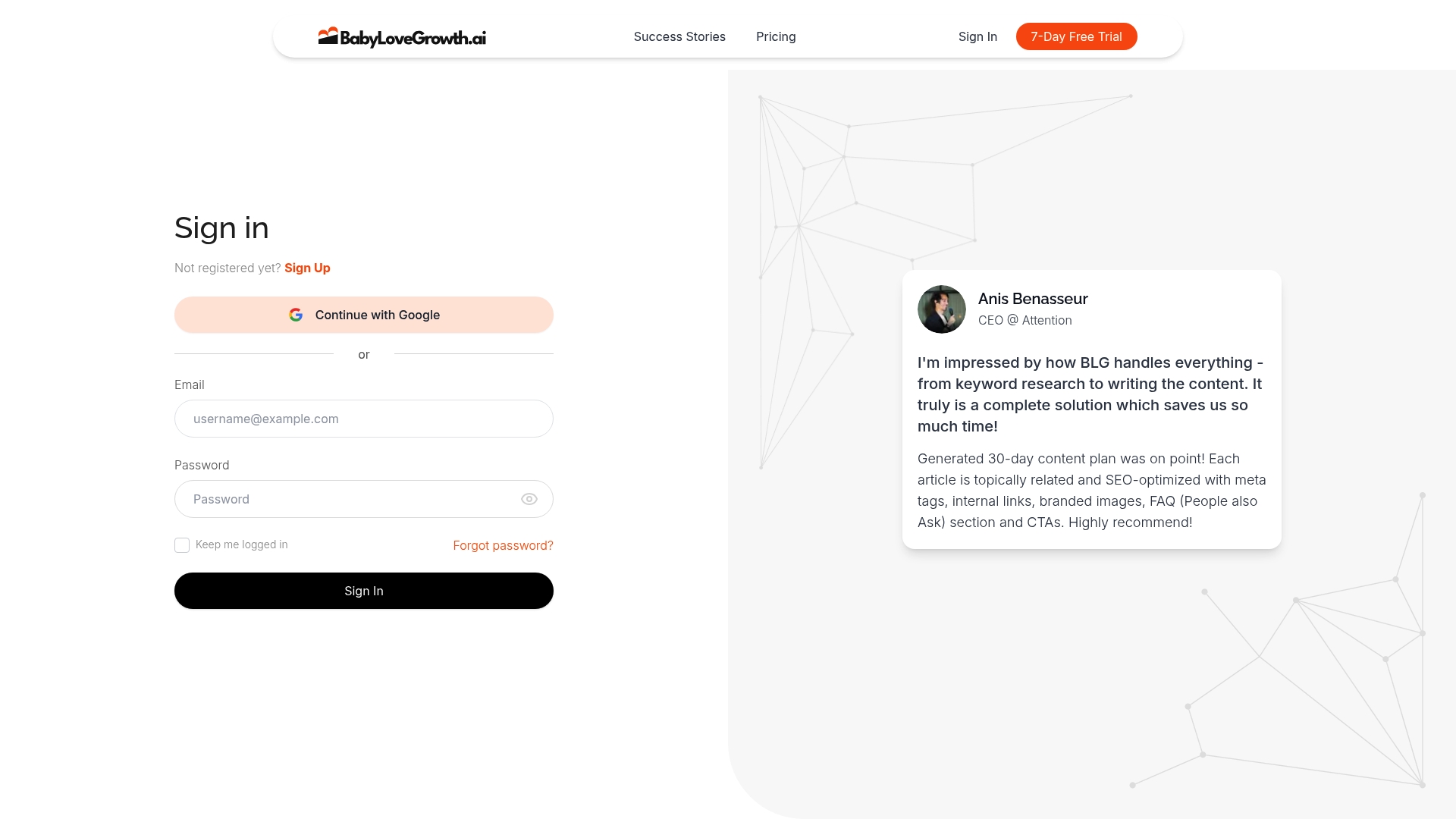
At Baby Love Growth AI, we recognize the pain points you face in enhancing your SEO strategies. Our platform offers essential functionalities that tackle these challenges head-on:
-
Keyword Discovery - Unlock the potential of untapped keywords to support your content clusters.
-
Keyword Clustering - Organize your topics for comprehensive coverage that boosts your rankings.
-
Content Generation - Create in-depth, valuable content optimized for both users and search engines effortlessly.
Stop delaying your success! Experience the transformative power of AI and start building your topical authority today. Visit https://babylovegrowth.ai to explore how our all-in-one solution can empower your digital marketing journey and help you skyrocket your online visibility.
Smart SEO,
Faster Growth!
Most Read Articles
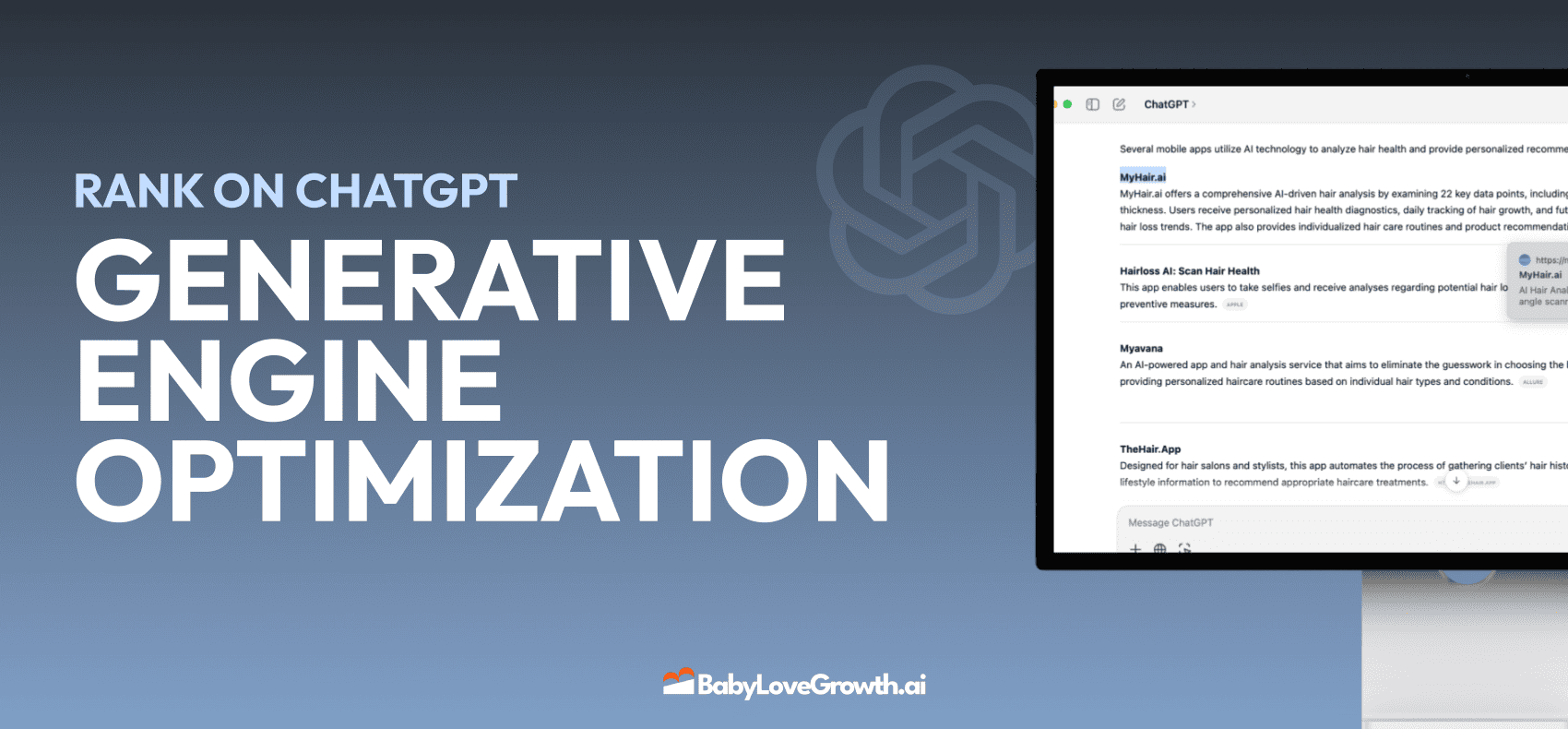
Generative Engine Optimization (GEO)
Learn how Generative Engine Optimization (GEO) helps your content rank in AI search engines like ChatGPT and Google AI. This comprehensive guide explains the differences between SEO and GEO, why it matters for your business, and practical steps to implement GEO strategies for better visibility in AI-generated responses.
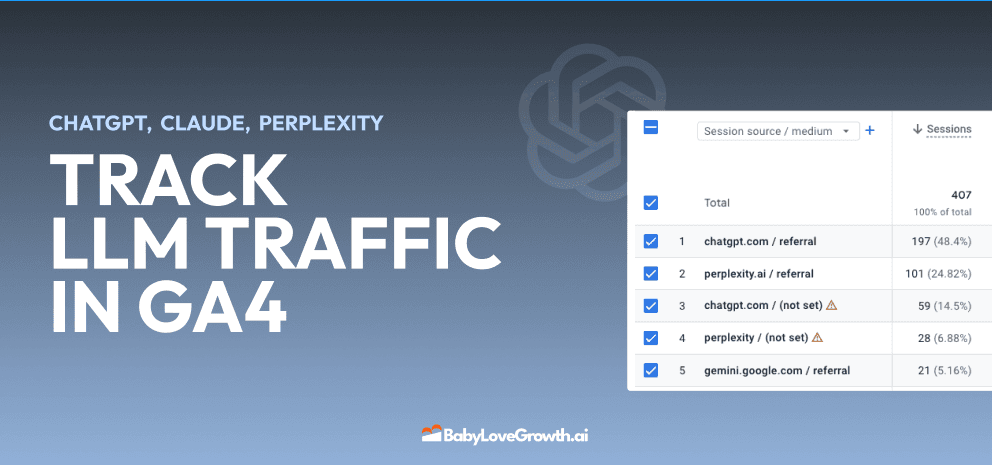
Track LLM Traffic in Google Analytics 4 (GA4)
Learn how to track and analyze traffic from AI sources like ChatGPT, Claude, Perplexity, and Google Gemini in Google Analytics 4. This step-by-step guide shows you how to set up custom filters to monitor AI-driven traffic and make data-driven decisions for your content strategy.
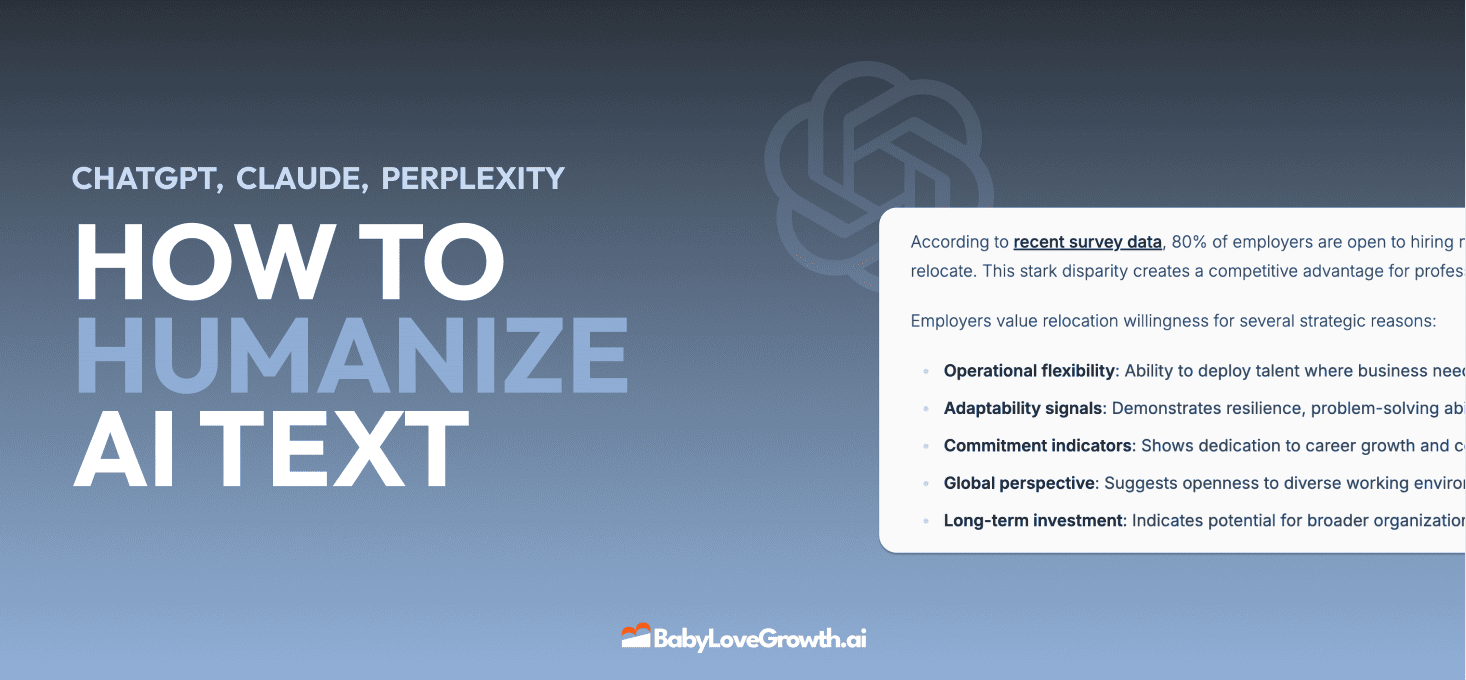
How to Humanize AI Text with Instructions
Learn practical techniques to make AI-generated content sound more natural and human. This guide covers active voice, direct addressing, concise writing, and other proven strategies to transform robotic text into engaging content.
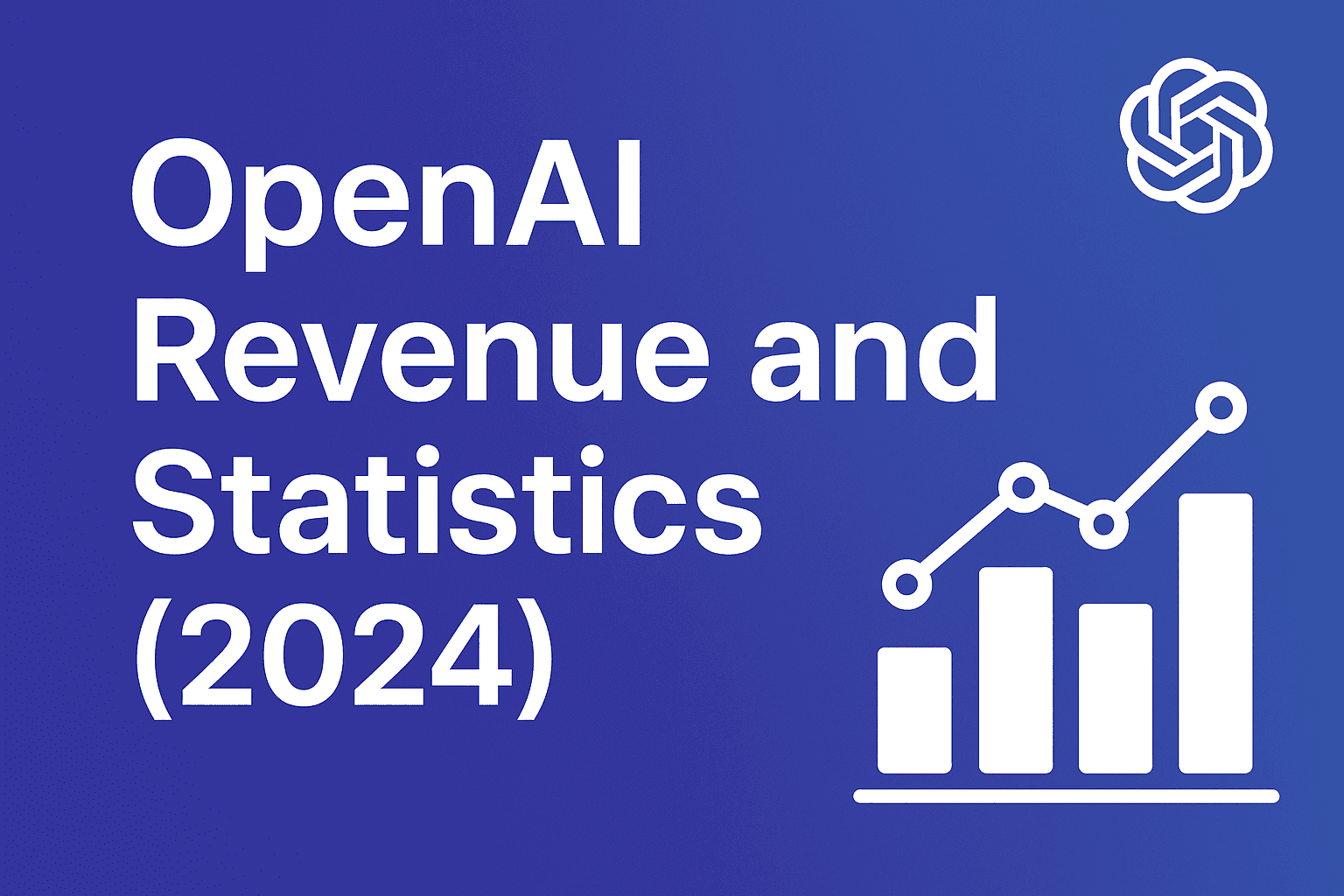
Open AI Revenue and Statistics (2024)
Comprehensive analysis of OpenAI financial performance, user engagement, and market position in 2023. Discover key statistics including $20B valuation, $1B projected revenue, and 100M+ monthly active users.